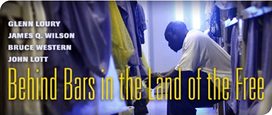Wilson argues that prison has a large deterrent effect on crime. I disagree. People are deterred from crime by the certainty and severity of punishment. Research reviewed by Dan Nagin (JSTOR subscription required) shows that the certainty of punishment deters more than the severity. People refrain from crime more out of a fear of getting caught, than a fear of the punishment that might follow. Additional police will thus deter crime more efficiently than additional prison time. Research also shows that people are deterred by the stigma of a criminal record. When severe punishment becomes commonplace, stigma, and its deterrent effect, are diluted. Today, 60 percent of young black male dropouts will go to prison. It is hard to see a strong deterrent effect in these statistics.
Wilson gets to the heart of the issue when he says that punishment expresses a retributive sentiment. Some people, he says, dislike work programs for released prisoners because the programs don’t quench the thirst for retribution. However, when the state’s vast power is used to vent feelings of righteous anger, we regularly over-reach, using that power to act out many different fears and anxieties, not just our anger at victimization. (The war on drugs was fueled partly by the frustrations of middle class families at the depredations of addiction at home, and not the scourge of drugs in poor urban neighborhoods.) The harshest retributive sentiments, sometimes stirred by political entrepreneurs, are also directed at the most disadvantaged and dishonored groups in society.
Retributive punishment — disproportionate and prejudiced — threatens public safety. Wilson’s proposal to offer employment programs only to “deserving” offenders illustrates the point. I think we should provide jobs, drug treatment, and other supports to people released from prison, precisely to reduce crime. Withholding this support, to vent our anger, only serves crime and the anger it causes.

